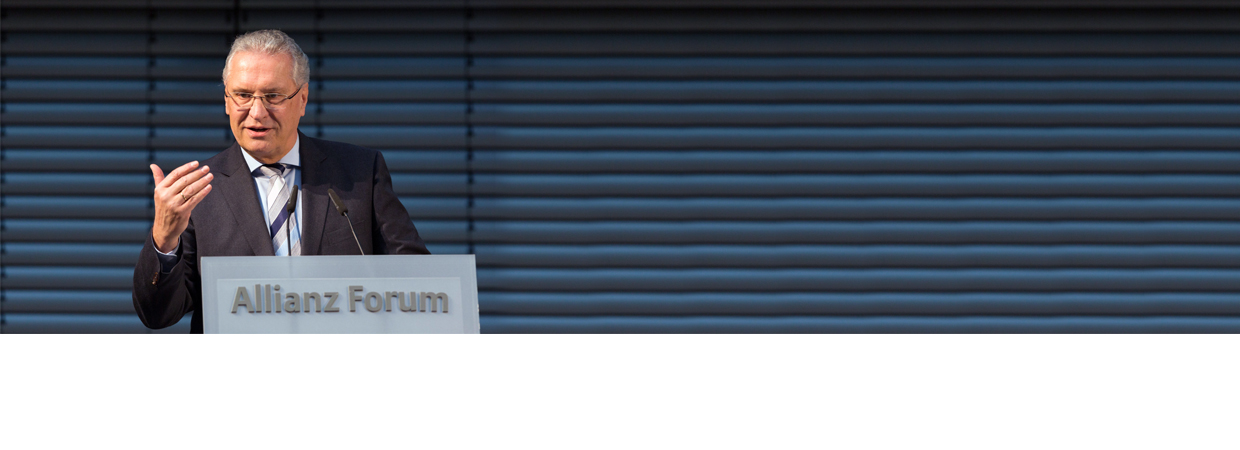-> Security and financial experts came together at the fourth STATE OF SECURITY
in Berlin
> BDSW-Vice President Friedrich P. Kötter demands paradigm shift in security
-> Focus on chances and risks caused by global upheavals for nations and companies
Berlin/Essen. At the fourth STATE OF SECURITY Conference at the Brandenburg Gate, an event organised by KÖTTER Security and German Business Protection in cooperation with Allianz SE, 100 participants discussed yesterday current and future security risks.
Macroeconomic and political developments have never been as unpredictable as they are today. Central banks and financial policymakers admit to flying blind. Lines in the sand, that only yesterday were considered to be sacrosanct, are now being crossed.”, Friedrich P. Kötter, member of the Board of Directors of KÖTTER SE & Co. KG Security, Berlin, explained in his opening speech. For companies in particular the question arises as to how optimal results can still be achieved in this uncertain climate.
Recent Survey Shows Importance of Resilience / Deficits in Implementation in Germany
The key word is resilience: “A resilient company becomes resistant to internal and external threats and thereby has a decisive competitive advantage”, the Vice President of the Bundesverband der Sicherheitswirtschaft (BDSW) emphasised. In terms of prevention, however, there is still a considerable need for action, as was made clear by the results of a survey conducted among the participants in the run up to the conference. Whilst almost 60 % of respondents recognised that resilience was a very important topic, only 25 % had implemented measures to strengthen their own resilience. Much remains to be done in order to effectively implement the paradigm shift, which has already taken place in the Anglo-Saxon countries, of resilience as a security concept in Germany.
At the same time, security of the future requires readjustments in the cooperation of the public and the private sector. The security industry is already making an important contribution to internal security. And there are further significant potentials, such as with regard to the much-needed relief of the police. "In order to take advantage of these opportunities, modern legal frameworks are a crucial prerequisite," emphasised Friedrich P. Kötter. "In view of the exploratory talks which are taking place not far from here, I appeal to the future Federal Government to set the legal reforms in the security industry high on the political agenda." This includes, besides the reforms to Article 34a of the Industrial Code applicable to the security industry, the creation of a central security law.
Assessments by Minister of State Herrmann and former ambassador Thomas Matussek
Joachim Herrmann (MdL), Bavaria’s State Minister of the Interior, for Building and Transport, and Thomas Matussek, a former ambassador, Vice President of the World Economic Council and Senior Advisor at Flint Global, added to these remarks.
Joachim Herrmann also raised in his presentation entitled „State of Security in Autumn 2017 – the Security Situation in Germany” the call for a stronger Public-Private Security Partnership. “Germany is one of the safest countries in the world. In order to further strengthen the high level of security in our country, we cannot solely rely on the improvement of our state security architecture. I see great potential in the increased cooperation with specialised companies for security issues. Close collaboration between the police and the security industry can be very beneficial. In Bavaria, we have had very good results, including in the fight against burglary. The joint fight against cybercrime is an equally important topic for the future. My appeal: Let us join forces to put a stop to criminals’ activities in Germany - for prosperity, security and freedom in our country.”
Thomas Matussek also underlined the importance of effective cooperation in Western security with his remarks on “The Global Security Situation – Challenges for Germany”. "The world is unravelling. The West, as we know it, seems to be disintegrating. But every crisis also opens up opportunities. President Trump's policy is a wake-up call for us, and the election of Emmanuel Macron a chance for Europe."
Allianz Chief Economist and other Top Speakers
Prof. Dr. Michael Heise, Chief Economist of Allianz Group, focused on the macro-economic dimensions in his presentation "How resilient is the financial sector?“. "The majority of financial companies have done their homework since the financial crisis. Institutions are more resilient today than they were ten years ago; re-regulatory measures such as higher capital requirements have also contributed to this. However at the same time, market risks and debt have continued to rise, and the 'hunt for yield' has driven many valuations to unprecedented levels. To keep tensions from mounting, monetary policy must be swiftly and decisively reversed."
Maxim Worcester, Advisory Board of German Business Protection, also touched on this development regarding the long-term adaptability and sustainability of companies in his comments on “Strengthening Resilience, Securing Companies”. "Resilient companies can master the transition processes and crises better by seeing the chance for change in every crisis. This gives such companies a decisive competitive edge."
Tobias Larsson, Head of Resilience 360 at Deutsche Post DHL (“Resilience in the Supply Chain – a Case Study”), Hans-Christoph Enge, Managing Partner at Lampe & Schwartze KG (“Insurance as a Factor of Resilience”), as well as Prof. Dr. Holger H. Mey, Vice President of Advanced Concepts at Airbus Defence and Space (“The Importance of Resilience for the High Tech Industry”) completed the series of top speakers presenting at this year's STATE OF SECURITY Conference.

